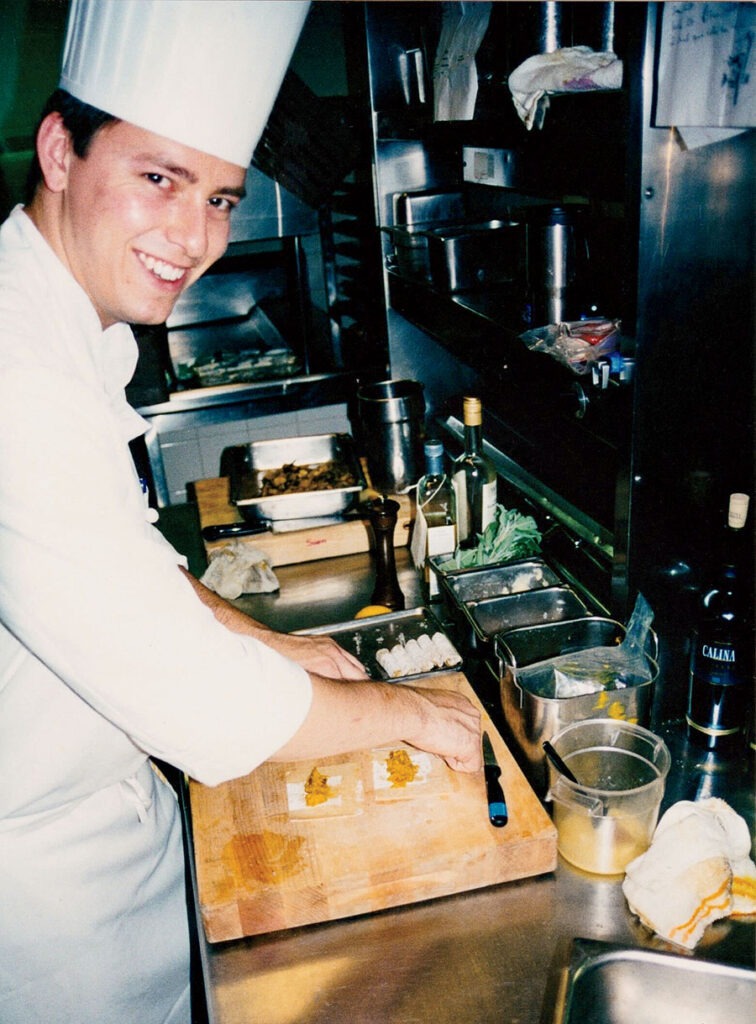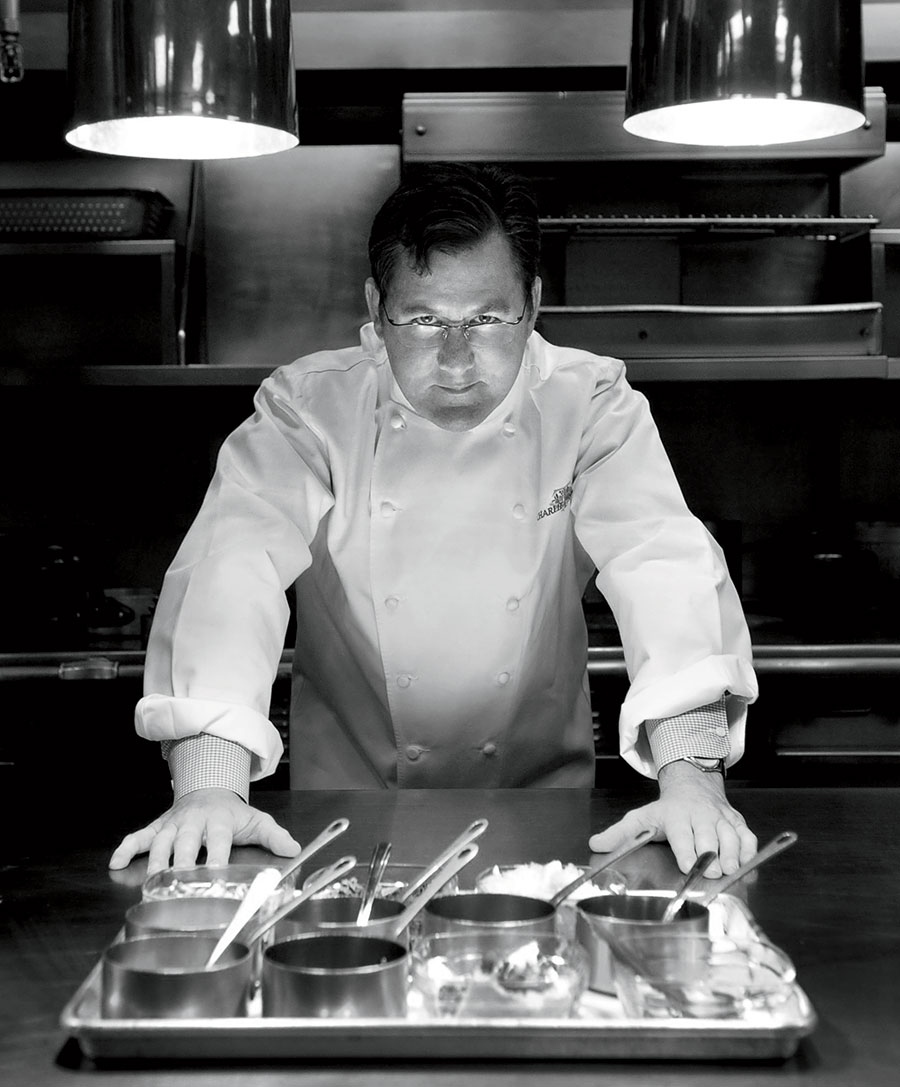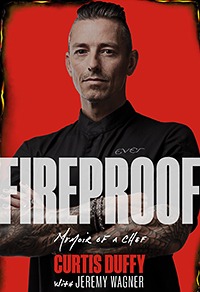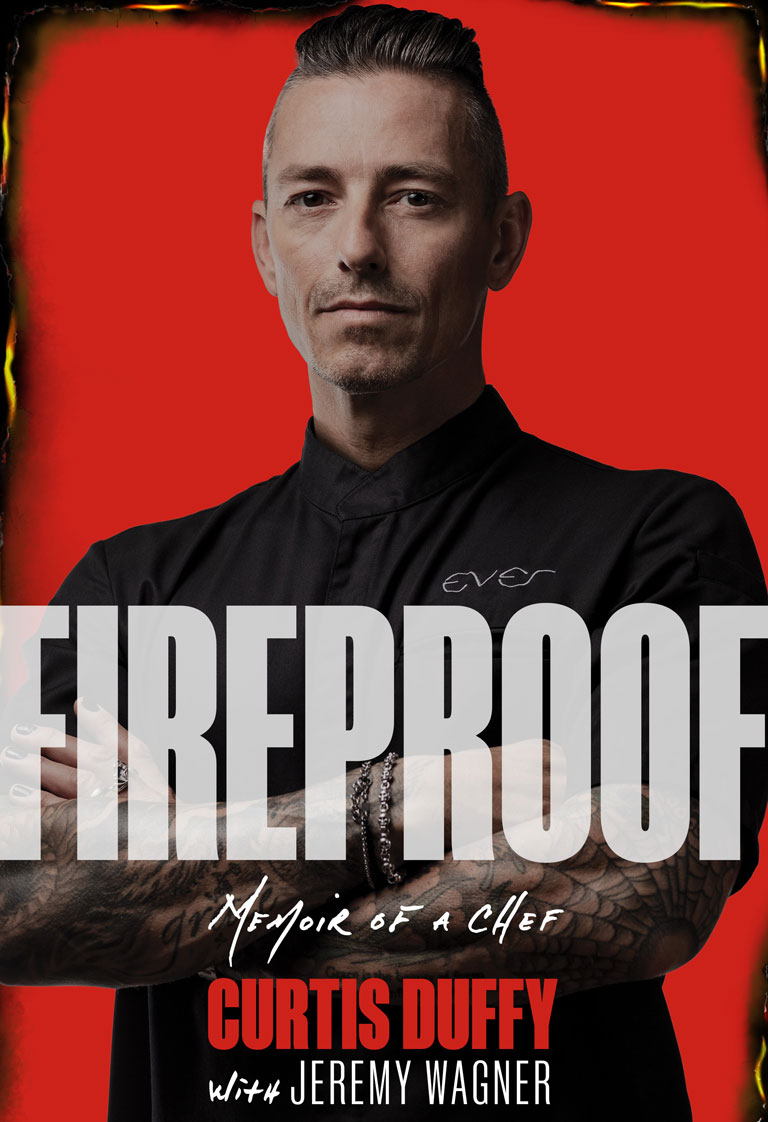In the mid-’90s, as I became even more captivated in my late teen years with becoming a chef, I devoured the Charlie Trotter cookbooks I’d found in an Ohio bookstore, falling in love with his style of food and philosophy. Then, after I got my first computer, I would scour the internet for new information on this guy and his restaurant. I was obsessed.
I moved to Chicago in 2000 solely to work for Charlie.
Working at Charlie Trotter’s was like physically living inside one of his books. I was relentlessly pushed to perform at a first-class level of excellence, learning directly from the master himself about innovations in restaurant and kitchen management. It was the hardest job I’ve ever had, but Charlie gave me a world-class education in the nuanced, sophisticated love affair between ambience, service, cuisine, and wine — a “four pillars” approach I use to this day.
The restaurant was beautiful from top to bottom. Charlie invested in the best, most modern kitchen equipment: custom-made French Bonnet stoves, made-to-order freezers, and a stainless-steel ceiling that ate vented smoke. The wine cellar was a gorgeous room, stocked with the best wines. The small, intimate dining rooms featured lush, cushy carpet and heavy, draped linens. There were beautiful sconces on the walls, and every chair was fabricated by an artist. The china was Limoges and came from Bernardaud, and the serving ware came from Christofle. Every detail was designed to exude luxury and add to the guest’s dining experience.
Then there was the cuisine. Charlie was on an entirely different, transcendent level. It wasn’t just about being fancy with beluga caviar and truffles. At that time, other restaurants didn’t respect vegetables the way they do now, and it was Charlie’s uncommon approach to them that won my heart. He would elevate and showcase vegetarian dishes and sauces in new and thoughtful ways, in the presentation and in the overall sensory experience of tasting and touching food, be it seeds, legumes, vegetables, or fruits.
He could take the simplest ingredients and turn them into something mind-blowing and extravagant. Charlie would make a dish pairing 55-plus-year-old balsamic vinegar with marinated portobello mushrooms, then mix that up with garlic, ginger, jalapeño, cilantro, and soy. There was an Asian-style haggis, where he took the internal organs of a sheep — lungs, liver, heart, etc. — and mixed them up with lemongrass, star anise, and ginger, along with traditional suet and stock, and stuffed it all into some type of animal casing.
He used unorthodox methods to motivate the staff, too. We might be asked to give a speech on a certain topic or write a book report or even engage in role-playing to better ourselves and the restaurant. Three days a week, Charlie would bring in a group — we might host underprivileged children or academic scholars one day, firefighters and police officers the next — to be fed gratis from the menu we would serve that night while we, the cooks, would explain the courses to the guests.
The twist? You would be asked to describe a course other than the one you were making that night. So if I were, say, working the meat station, I might be pulled up to talk about the dessert. If you were the reservationist, Charlie might grab you and say, “Joanne, please come here! We’d love for you to tell the students how we pursue excellence in the kitchen every day.”
I was 24 and terrified to speak in front of 60 people at a time. But that was what was great about it: You were never in a comfort zone under Charlie Trotter’s roof. And he made sure you weren’t just cooking but thinking. It helped us to internalize a mentality of excellence. That’s infectious. You start thinking that way, everyone around you is thinking that way, and it’s this beautiful culture of people wanting nothing more than to just get better every day.
In the three and a half years I spent at Charlie Trotter’s, I learned a great deal about discipline, skill, service, and curiosity. He felt a chef should be not just happy and fulfilled in his career but also philosophically satisfied.
I’ll attempt to distill the Trotter path:
1. Embrace change
The first year I was there, the restaurant closed for two weeks in late July and early August. Why? Restaurants at that level rely on everybody to be there every single day. When you give people time off here and there, it screws with the system. So the idea is to give everybody time off all at once.
But that didn’t mean there wasn’t any homework. Before that first break, Charlie pulled me into his office and gave me a copy of The Fountainhead by Ayn Rand. He was in love with that book. Every cook in his kitchen had read it — some, a few times. It’s one of those books that have you questioning lifelong assumptions. It’s a great story about not getting comfortable doing everything someone else’s way. The idea is to be not just different and creative but flexible, malleable, open to change. That’s what makes cuisine so beautiful — there are no rules. Anyone who tells you otherwise is either asleep at the wheel or a liar.
Charlie Trotter was such an iconoclast. He kicked the door in on the steak-and-pizza-laden Chicago scene with his European approach to foods that paired well with wine, and he meticulously prepared and presented it all with an attitude of Asian minimalism, even though neither Europe nor Asia was identifiable in his menus. Whatever anyone decided had to be the status quo, you can bet your ass that Charlie was going to do the opposite. Before Charlie, I’m pretty sure Chicago had never seen courses consisting of, say, unagi terrine with ruby red grapefruit and grilled duck heart, followed by bobwhite quail in a coriander crust served with chicken liver and watermelon radish, and a sea urchin ice cream with white chocolate and guava for dessert. All paired with a vintage Dom Pérignon.
2. Don’t hold hands, hand off tools
Charlie would gently encourage you, but his approach wasn’t like, “It’s my responsibility to make sure Curtis isn’t being complacent. I must motivate him to be creative!” He believed his job was to provide the tools to help a chef find their own way. Truth is, like anything great in life, no one can do it for you.
I’ve carried that vibe forward into my own career: As part of our hiring process, we bring people in for a stage to see which are motivated. You give them one task to see how they do certain things. When they’re done, are they looking to move on to the next one or are they standing there waiting for somebody to give them something else to do? People who always ask, “What’s next?” are the ones who’re going to push hard all day long, tackle a list 50 things deep and cut it down to zero. Get as many of those employees as you can.
Did any of my ideas ever make it onto the menu at Charlie Trotter’s? Maybe one. I remember a scallop and caviar dish that Matthias Merges, the chef de cuisine, and I created. It was very simple but good.
It wasn’t my job to be creating at Charlie Trotter’s. My main responsibility was to make sure that the food I cooked was the absolute best every single time each night — and if I could make it better the next night, that’s what I’d do.
3. Excellence, from here to eternity
The most important message I absorbed at Charlie Trotter’s was the aforementioned credo: Pursue excellence every day. And that came from Charlie himself. Most of us found the experience gratifying and life-changing. When I think of the people I met during my Trotter days, I’m amazed by how many went on to become culinary superstars.
Charlie would get salty when an employee left. His attitude was, “Don’t bother putting a notice in.”
Look at Matthias Merges: He has opened several restaurants, beginning with Yusho and A10. Graham Elliot has become popular in the food TV world, serving as a judge on MasterChef and Top Chef, and has owned acclaimed restaurants. Then there’s the late Homaro “Omar” Cantu, who helmed Moto. Giuseppe Tentori had GT Prime and GT Fish & Oyster. David LeFevre now has multiple restaurants in L.A., all very successful. You can’t forget Grant Achatz of Alinea; he was at Charlie Trotter’s a few years before I was.
Charlie inspired me to aspire to become the best, and he gave me the confidence. He did this by investing in the best of everything so that his staff could perform at the highest level. He believed that to succeed you had to be surrounded by the finest people, the finest equipment, and the finest ingredients in the world.
Above all, you need staff to buy into Mission: Excellence. Staff who buy in possess the highest respect for the restaurant. They have a stake in it. They are proud and take it seriously. And you can taste that in the food.

Charlie could be a real hothead. He was a man who supposedly throttled Graham Elliot in front of the kitchen staff. My old pal Omar Cantu told me that he was there with Graham when it happened. Omar and Elliot were joking in the kitchen, and Charlie didn’t like that, so he walked up to Graham, put his hands around Graham’s neck in a mock stranglehold. “Don’t you know that I will fucking kill you right now?”
Charlie would get salty when any of his employees left. His attitude was, “Fuck you. Don’t bother putting a notice in. You already decided that you’re done, so just cut the shit and go.”
When I accepted a job in 2003 as a pastry chef for Grant Achatz, who was then at Trio in Evanston, I wanted Charlie to know first. For a while, it felt like he was dodging me, like he sensed my exit was imminent. I finally caught up with him as I swept the hallway between the restaurant and the chef’s office. He was running past, and I said, “Chef, I need five minutes with you.” Anytime you tell the chef that, he knows what you’re going to say next. I had to say it anyway: “You know, Chef, it’s been an incredible experience here, but … I feel that it’s time to move on.”
“OK, Duffy. You want to go now? That’s fine. Go get changed out of your uniform.”
“No, I want to give you plenty of time and notice. A month.” For a cook, two weeks’ notice is fine. But out of respect, I wanted to give him more time to fill my position.
“I don’t need that. You’re welcome to stay, but I don’t really need it.”
I ended up staying and worked my ass off. Today, I always tell my cooks when they leave, “It doesn’t matter if you spent 10 years or four months here — the last two weeks of your time are what will be remembered. So kill it. Outwork everybody.”
Soon after I left, Charlie was served with a massive class-action lawsuit, which was big news in Chicago and the culinary world. Though I don’t remember signing anything to be a part of it, my name was somehow on the plaintiffs’ list, which incited Charlie’s fury. It inflicted a permanent strain on our relationship.
The chef who filed the suit was Beverly Kim. The complaint said that back-of-the-house employees were expected to work 12-to-14-hour shifts, six days a week, without overtime pay. Someone else from the front-of-the-house staff also filed a class action over tip distribution. The two lawsuits hit Trotter like a one-two punch.
In my mind, if you’re at the restaurant, you’re there, period. No matter what. Don’t bitch. You know what you’re getting into, and OT is a given. Everybody worked for shift pay back then. You didn’t clock in; you didn’t clock out. You showed up, you got paid a certain amount of money: $60 a day. Granted, it should be called shit pay, not shift pay. But Charlie was up front about the deal when you started: If you don’t like it, don’t work here.
One day I got a check in the mail from the settlement. When I saw it, I didn’t ask any questions: When you’re making 16 grand a year and suddenly get a check in the mail for $17,000, guess what? You’re gonna cash it.
I used the money to educate myself. I bought books and read. My wife and I traveled to Paris for two weeks and then Spain for another two, all so I could learn more about — and dine at — legendary restaurants I had only dreamed of experiencing, where my food gods dwelled. I learned so much, and I never would’ve been able to do it without that check.
And Charlie Trotter? He was understandably pissed and bitter.
In For Grace, the documentary about the creation of my first restaurant, there’s a tense scene with me, Michael Muser — my partner at Grace and then at Ever — and Charlie at the front door of Trotter’s. Some months after Charlie announced in 2012 that he’d be closing his restaurant after 25 years, Michael and I thought we’d go there one last time and bring the camera crew along to capture what we thought would be a special moment. I’d been to Charlie Trotter’s many times after I’d left and Charlie had always welcomed me back — even after the 2003 lawsuit. Charlie was always cordial. He’d say, “Hey, Chef, how are you? Nice to see you.”
So imagine my surprise when Charlie tore into me and refused to allow me inside. The camera crew filmed this along with him cussing me out about joining the class-action lawsuit and taking a check for $50,000.
I never received $50,000.
I don’t know if it was the camera crew or if Charlie was maybe feeling extra fuck-it amid his swan song. Whatever his reason, if his intention was to wound me, he succeeded: I was hurt and super embarrassed.
I wish we could’ve mended that fence because Charlie was a huge inspiration to me. Sadly, it wasn’t long after that nasty encounter that Charlie died. He was 54.





